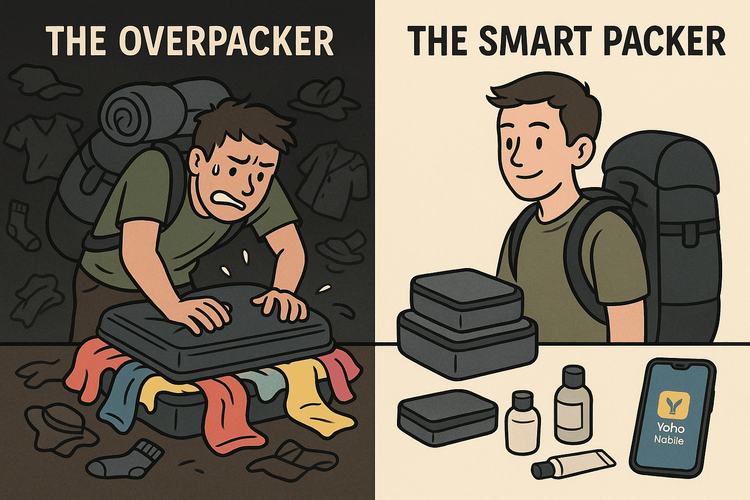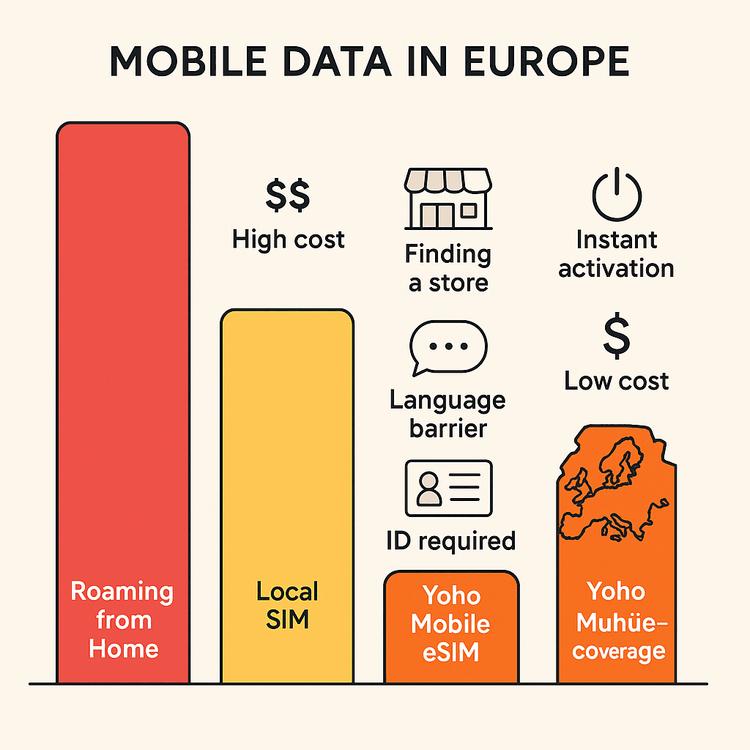Your first backpacking trip to Europe is a rite of passage. The thought of hopping between countries, exploring ancient cities, and meeting fellow travelers is exhilarating. But this adventure can quickly turn stressful if you fall into common rookie traps. Drawing from the wisdom of seasoned backpackers on platforms like Reddit, we’ve compiled the top 10 mistakes to avoid for a smoother, cheaper, and more memorable journey.
Before you even book your flight, it’s smart to get your communication sorted. A seamless trip requires reliable data for maps, bookings, and staying in touch. Why not start with a risk-free test? Try out Yoho Mobile’s free eSIM trial to see how easy it is to stay connected from the moment you land.
1. Overpacking Your Life into One Bag
This is the cardinal sin of first-time backpackers. It’s tempting to pack for every possible scenario, but lugging a heavy bag over cobblestone streets and up five flights of hostel stairs is a nightmare. Remember, you can buy almost anything you need in Europe. Plus, budget airlines like Ryanair have notoriously strict (and expensive) baggage policies.
How to avoid it: Pack a versatile, layer-friendly wardrobe. Use packing cubes to maximize space. Aim for a backpack that’s no more than 40-50 liters. Your back will thank you. For more detailed tips, check out our ultimate packing list for Europe.

2. Underestimating Travel Days
A common mistake is seeing a 2-hour train ride on the schedule and thinking you have the whole day free. In reality, a “travel day” consumes much more time. You have to pack up, check out, navigate to the station, wait for your train, travel, find your new accommodation, and check in. A seemingly short trip can easily eat up half a day or more, leaving you exhausted.
How to avoid it: Treat travel days as just that—days for travel. Don’t plan major sightseeing activities. Instead, use them as an opportunity to slowly explore the neighborhood around your new hostel and find a good spot for dinner.
3. Ignoring the Hidden Costs of Budget Airlines
That €15 flight from Paris to Rome looks like a steal, right? It can be, but only if you play by the rules. Budget airlines make their money from ancillary fees. Checked baggage, carry-on bags that are slightly too large, printing a boarding pass at the airport, and even paying with a credit card can all come with hefty charges that make your cheap flight not so cheap.
How to avoid it: Read the fine print before booking. Pay for any necessary extras online in advance, as it’s always cheaper than at the airport. For more info, it’s worth checking the specific policies on sites like Wego.
4. Getting Wrecked by Roaming Fees
Nothing ruins the post-trip glow like a phone bill with hundreds of dollars in international roaming charges. Many travelers either forget to turn off roaming or assume their home plan’s international pass is a good deal. It rarely is. You need data for Google Maps, translating menus, and last-minute bookings. Going without it isn’t practical, but paying a fortune is a classic Europe travel mistake.
How to avoid it: Ditch your home provider’s expensive plan and get a travel eSIM. With a Yoho Mobile eSIM for Europe, you can get online the second you land. There’s no need to hunt for a physical SIM card shop. Plus, one plan covers dozens of countries, so you don’t need a new SIM for every border you cross. For iOS users, the installation is a breeze—no QR codes needed, just tap ‘Install’ after purchase and you’re set in under a minute. And with our Yoho Care service, you’ll never worry about being disconnected, even if you run out of high-speed data.

Ready for stress-free connectivity? Explore Yoho Mobile’s flexible and affordable eSIM plans for Europe.
5. Over-scheduling Your Itinerary
Trying to see 10 cities in 14 days is a recipe for burnout. A packed itinerary might look impressive on paper, but it leaves no room for spontaneity—which is often where the best travel memories are made. You’ll spend more time in transit than actually experiencing the places you visit.
How to avoid it: Less is more. Pick fewer locations and spend more time in each. This allows you to discover hidden gems, connect with locals, and not feel rushed. It’s better to truly know three cities than to have a fleeting glimpse of ten.
6. Only Visiting the Major Capital Cities
Paris, Rome, London, and Amsterdam are incredible, but they’re also crowded and expensive. Europe’s magic often lies in its smaller towns and second cities. Think of places like Bruges in Belgium, Seville in Spain, or the charming villages of the Swiss Alps. These spots offer a more authentic and often more affordable experience.
How to avoid it: When planning your route, intentionally include a few smaller destinations between the big capitals. You’ll get a better sense of the country’s culture and give your budget a break.
7. Falling for Obvious Tourist Traps
Restaurants with multi-language picture menus right next to a major landmark? That’s a tourist trap. Exchanging currency at the airport? Another trap. These places prey on tired and uninformed travelers with inflated prices and subpar quality.
How to avoid it: Walk a few blocks away from major attractions before picking a restaurant. Use an ATM from a reputable bank for cash instead of a currency exchange kiosk. A quick search on your phone (using your affordable Yoho Mobile data!) can save you from a bad, overpriced meal.
8. Forgetting to Validate Your Train Ticket
In many European countries, including Italy and Germany, simply buying a train or bus ticket isn’t enough. You must validate it in a small stamping machine on the platform or upon boarding. If you’re caught with an unvalidated ticket, you face a hefty on-the-spot fine, and pleading ignorance won’t work.
How to avoid it: Always look for the validation machines (they are often green, yellow, or red boxes) before you board. When in doubt, ask a local or a station employee. This simple step can save you €50 or more.
9. Not Informing Your Bank About Your Trip
Imagine trying to pay for your hostel and your card gets declined. It’s a common scenario if you forget to tell your bank you’re traveling. Their fraud detection systems might see a transaction from another continent and immediately block your card, leaving you in a tough spot.
How to avoid it: Before you leave, log into your online banking portal or call your bank to set up a travel notification. It only takes a few minutes and prevents a major headache.
10. Assuming Your Phone is Ready to Go
Besides your bank, you need to prepare your phone. Not all devices are created equal when it comes to international travel. To use an eSIM, your phone must be carrier-unlocked and compatible with eSIM technology. Finding this out when you’re already abroad is too late.
How to avoid it: A few weeks before your trip, confirm your phone is unlocked by contacting your home carrier. Then, you can easily check our eSIM compatible device list to ensure a smooth setup with Yoho Mobile when you arrive.
Frequently Asked Questions (FAQ)
What’s the best way to stay connected in Europe on a budget?
An eSIM is by far the most budget-friendly and convenient option. Instead of paying for expensive international roaming or buying a new physical SIM in every country, an eSIM like those from Yoho Mobile provides affordable data across the continent with one simple plan, activated instantly on your phone.
How can I avoid high phone bills while traveling in Europe?
First, turn off data roaming on your primary SIM card before you leave. Second, use Wi-Fi whenever possible. Most importantly, purchase a travel-specific eSIM for Europe. This gives you a set amount of data for a fixed, prepaid price, completely eliminating the risk of surprise roaming charges.
Is it better to book hostels in advance for a first time backpacking trip to Europe?
For your first trip, it’s wise to book your first few nights in each city in advance, especially during peak season (summer). This reduces stress. However, having reliable mobile data allows you the flexibility to book your next stop on the go using apps like Hostelworld, which is great if you decide to change your plans.
Can I use my phone in Europe without roaming?
Absolutely. By using a dual-SIM phone with an eSIM, you can use the eSIM for affordable data while keeping your primary number active for calls or texts if needed (though be aware of your home carrier’s charges for that). This setup gives you the best of both worlds: full connectivity without the roaming fees.
Conclusion
Your first backpacking adventure in Europe will be one of the most rewarding experiences of your life. By avoiding these ten common mistakes—from overpacking to getting hit with roaming fees—you set yourself up for a journey that’s more about discovery and less about stress.
Being prepared with smart solutions for packing, planning, and staying connected is the key. With a flexible eSIM from Yoho Mobile, you can navigate, book, and share your entire adventure effortlessly and affordably.
